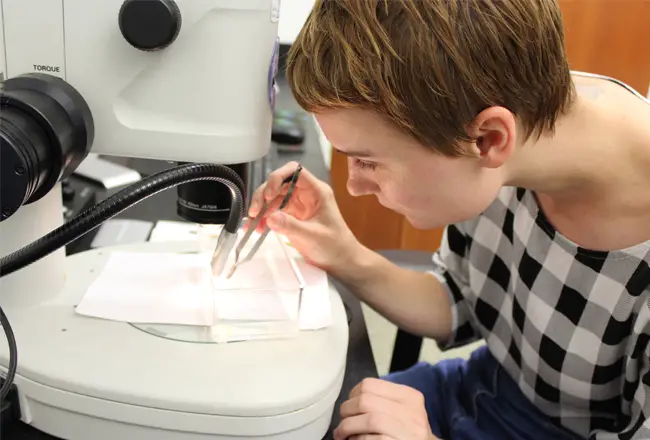
Standing in the New York Botanical Garden’s William and Lynda Steere Herbarium, home to the second largest preserved plant collection in the world, Sarah Lawrence College senior Isabel Bilek said she’s always been interested in the “underdogs” of the
biology field.
“The little microbiology species ””cyanobacteria, algae, just plain bacteria, fungi””I’ve always taken an interest in what these small, kind of unnoticed species and specimens do,” Bilek said.
“Understudied species” is the term used by Kenneth Karol, an associate curator at the Botanical Garden’s Cullman Program for Molecular Systematics. Under Karol’s supervision, Bilek is spending the summer studying those species, doing field research trips throughout the country and studying algae samples in the botanical garden’s labs.
Bilek is at the Bronx museum and research center this summer as part of the Sarah Lawrence science externship program, a new addition to its summer science offerings. She is one of four students at the small Yonkers liberal arts college with paid externships from the school for research roles at top centers in the region. The program is funded through a $2 million donation from Suzanne Salter Arkin, a Manhattan resident who graduated from the college in 1960.
Other students chosen for this year’s externship program are working on research projects at Weill Cornell Medical Center, New York University and Mount Sinai School of Medicine.
For her summer externship, Bilek is working toward using DNA analysis and morphological observations to create an online master identification key for algae. The key would catalog observable traits of different algae types to help people identify the individual species they find in their local lakes and rivers.
Algae may be an underdog, but there’s a value to better understanding it. Bilek and Karol said properly identifying algae can help people understand changes to their water quality or identify biodiversity hotspots.
“I’m from Minnesota, the land of 10,000 lakes,” Bilek said. “I was surrounded by little ponds and the algae growing in those ponds, my entire life. I want to know, are those algae going to be around much longer? What does global climate change mean for these things? What does human influence mean?”
The externship builds on the work Bilek did for a yearlong independent study at the Botanical Garden. For that project, she extracted DNA from algae specimens, some hundreds of years old, stored in the Botanical Garden”™s herbarium.
Bilek had been offered a summer research internship at the Botanical Garden before, but said she couldn’t make a summer in New York work financially. A stipend from the Suzanne Salter Arkin Science Endowment helped cover her expenses this time.
“It has allowed us a lot of freedom to take her creativity, analytical thinking and say, ”˜OK, this is your playground, go use it,” Karol said. “”™Don’t break anything.”™”
The summer program”™s benefactor, Arkin, said she is especially interested in the way a liberal arts education can help prepare a person to enter a scientific field. Her son, while not a Sarah Lawrence graduate, attended a liberal arts college before going on to graduate study and becoming a research scientist in bioengineering at the University of California at Berkeley.
Arkin approached the school looking for a way to help its science program, which she acknowledged had already grown significantly from the single Bunsen burner and microscope she remembered in her time there.
“In this world, liberal arts have to include science, and maybe someday Sarah Lawrence will be known as a school for liberal arts and the sciences,” Arkin said.
While the college is better known for the arts and humanities, the expansion of the Sarah Lawrence summer research program is part of an effort by the school to stress that a liberal arts education can help produce well-rounded scientists.
“What small liberal arts colleges really provide is the training for the students to think independently and really work through information and data in a manner that’s not strictly rote memorization,” said Drew Cressman, a biology professor at Sarah Lawrence and director of the school’s summer research program
Bilek said attending Sarah Lawrence allowed her to explore a wide range of disciplines rather than having to choose a major in which to focus her studies. She said the skills she learns through different disciplines at the college often overlap.
“It’s so important that our scientists aren’t just studying science,” Bilek said. “Because I think you need all of those other perspectives to attack the questions we are asking today in science. You can’t just know chemistry. You also have to know, philosophically, why you need chemistry, what it implies for people and all of the overlaps.”




















